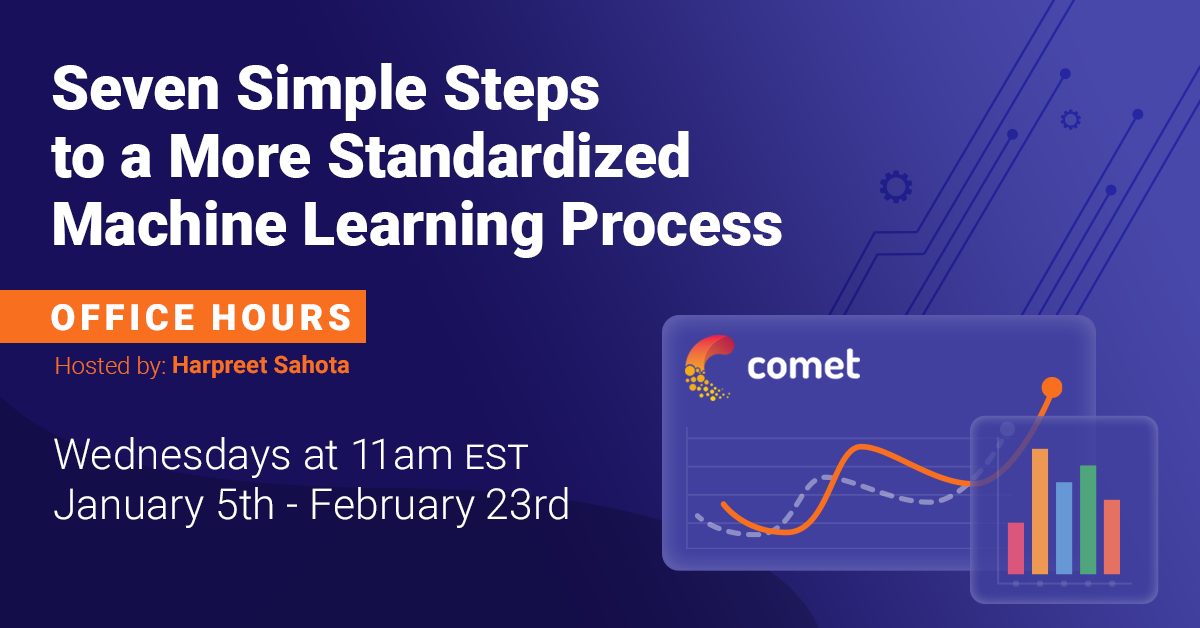Comet Office Hours: Recap for August 29, 2021
Welcome to another recap of the Comet ML Office Hours, powered by The Artists of Data Science! Before jumping in, a quick housekeeping note…
We will not be hosting Office Hours this upcoming Sunday, Sept 5th
Harpreet will be on a much-deserved vacation, and this weekend is also Labor Day weekend in the states. But fear not! We’ll be back in action Sunday, September 12.
This past week, there were three threads of discussion that I found interesting and wanted to share. The first is near and dear to our hearts at Comet and centers on more effectively managing ML projects; the second is focused on convincing business stakeholders to prioritize foundational data infrastructure; and the third is a back and forth on tips for “recharging” (related to a previous discussion about burnout)
As a reminder, we’d love to see any and all of you at these hourlong sessions—so feel free to register for upcoming Office Hours sessions here!
As always, there’s a lot more in the full session (which you can find on Harpreet’s YouTube channel), so be sure to check it out, alongside all of Harpeet’s other excellent content.
Creating baseline models and managing ML experiments
This topic came about based on a question from new community member Paul Fentress, who was looking for some advice about job searches coming out of school—and we ended up where we often do in discussions like this: talking about the importance of doing projects.
However, in this discussion, Harpreet covered a couple of specifics that provided some context on key components of effective ML projects: creating a baseline model, and developing a more principled experiment management approach.
Pitching business stakeholders on the need to build foundational data infrastructure
It’s a story as old as time, and not just in the world of data science—managers want a particular outcome yesterday, but practitioners on the ground confront unexpected issues, or don’t have sufficient foundational infrastructure in place to efficiently do their work.
And it was this dynamic that data engineer Christian brought up that spurred this thread of conversation. So what can you do as an individual contributor when being asked to meet difficult deadlines when there’s shaky ground underfoot?
The group explores a few possibilities in the clip below.
Tips for “recharging”
A couple of weeks ago, the group had a great discussion about the nature of burnout and ways we might be able to avoid (and confront) it. Following up on that discussion, Office Hours regular Kris asked the group what they do to recharge.
From destroying the routine, to dissolving the ego, to hanging out with kids, to challenging preconceived notions of the world that exists right in front of you, the groups had a number of interesting tips and some great perspective to offer.
Resources Mentioned
As always, the threads of conversation led to the sharing of a number of different resources that you might find helpful.
- How To Implement Baseline Machine Learning Algorithms From Scratch With Python, Jason Brownlee
- The Pragmatic Programmer, Andrew Hunt
- Machine Learning for Algorithmic Trading, Stefan Jansen
Enjoy the Conversations Above? Join Us!
We run these virtual Office Hours every Sunday at 12pm ET (New York, NY). Completely free to attend and participate, and we’d love to see any and all of you there, help address any questions you might have, and just hang out and talk all things data science and machine learning!
Register for Comet Office Hours
One last thing…
We recently launched The Comet Newsletter, which offers a weekly inside look at all things data science and ML, featuring expert takes and perspective from our team. We have big things planned for both Office Hours and the newsletter, so be sure to subscribe if you haven’t already!
Subscribe to the Comet Newsletter
